Contents
Market Overview
U.S. rates stabilized with the dollar. In a week where President Trump was impeached for a second time and ten Republicans broke rank, market events instead shifted to monetary policy. Indeed the debate seems to have split FOMC members at least when it comes to inflation and tapering the Fed’s extensive $120bn/month bond buying program. Within Powell’s Princeton remarks he reiterated Brainard’s FAIT point regarding Core PCE rising above 2% and cited similar comments to Clarida on fiscal policy. However, the statement that U.S. debt was on an “unsustainable” path was unsettling and caused U.S. Treasuries to widen, before Powell added a number of caveats. Perhaps a turning point came with President-elect Biden’s fiscal package announcement of $1.9tn. However, the inclusion of ambitious asks on raising the minimum wage and prospects of higher taxes does lengthen the odds that it will pass. We also note that U.S. earnings season started strong with JPM posting impressive 4Q gains, which temporarily offset weaker retail sales and overshadows higher jobless claims after negative ADP and NFP prints last week. The mixed tone saw EM credit down 0.6%, despite U.S. Treasuries closing 1-3 bps tighter as questions arose over Pfizer’s vaccine production capacity that caused a cyclical sell-off. Nevertheless, Zambia, Sri Lanka and Armenia all outperformed on the week, but Lebanon, Argentina and Suriname lagged.
After China’s trade data offered further green-shoots into 1Q, we expect the momentum to continue into next week. We expect to see solid industrial production growth of 7% and retail sales growth closer to 6%, but concede that most attention will focus on 4Q GDP where consensus is pinned at 6.2%. Beyond that, we expect most EM central banks to remain on hold, with key releases from Brazil (2.0%), China (3.85%), Indonesia (3.75%), Malaysia (1.75%), South Africa (3.5%), Turkey (17.0%) and Ukraine (6.0%). Meanwhile, South Africa will also be out with inflation, where a lower print of 3% vs 3.2% previously is expected given widespread lockdown measures until base effects kick-in next month. Similarly, we look out for inflation releases in Hong Kong, Mexico and Poland.
Fixed Income
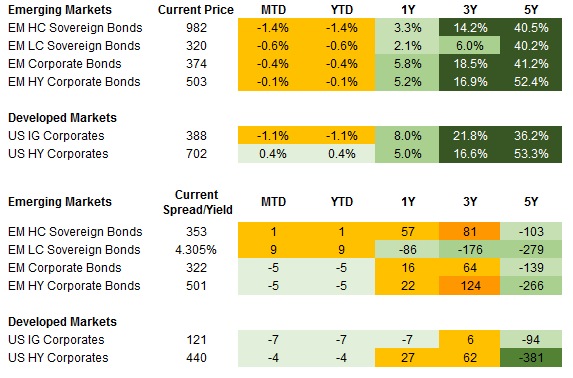
Equities
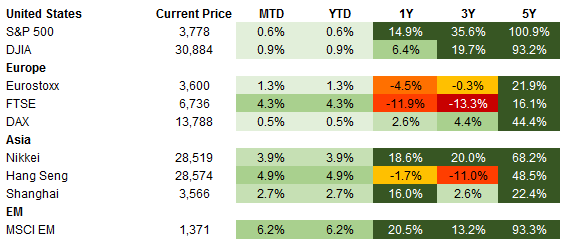
Commodities

Source for data tables: Bloomberg, JPMorgan, Gramercy. EM Fixed Income is represented by the following JPMorgan Indicies: EMBI Global, GBI-EM Global Diversified, CEMBI Broad Diversified and CEMBI Broad High Yield. DM Fixed Income is represented by the JPMorgan JULI Total Return Index and Domestic High Yield Index. Fixed Income, Equity and Commodity data is as of January 15, 2021 (Mid Afternoon).
Emerging Markets Weekly Highlights
Bolsonaro allies gain traction in Brazil’s Senate and Lower House Speakership races, easing market concerns about left-wing challenges and the potential impact on the critical post-COVID-19 economic policy path; South Africa extends restrictions to deal with new COVID-19 mutation, with low expectations for vaccine rollout; Mexico’s consideration of autonomous agency reform weighs on its institutional outlook; Costa Rica resumes talks with the IMF over a program, but domestic political obstacles remain formidable; and Global emerging market corporates in focus: Open the floodgates.
Bolsonaro allies gain traction in Brazil’s Senate and Lower House Speakership races, easing market concerns about left-wing challenges and the potential impact on the critical post-COVID-19 economic policy path
Event: Administration-backed candidates, Arthur Lira in the Lower House and Rodrigo Pacheco in the Senate, appear to be solidifying their leads and are well positioned to secure the Speakership roles when elections are held on February 1st.
Gramercy commentary: Both races carry material market implications, as their outcomes, especially the one in the Lower House, will influence the fiscal reform agenda in the final years of the Bolsonaro Administration. Fiscal reform momentum, or lack thereof, will be a key determinant of market sentiment on Brazil in 2021-22, as the economy and government budgets navigate the unwinding of extraordinary fiscal support measures rolled out during the pandemic. In addition, general elections will take place in late 2022, further complicating fiscal consolidation efforts in the pre-election period. In that context, having the ability to rely on friendly congressional leadership to whip votes for difficult policy measures will be critical for the Bolsonaro Administration and Brazil’s credit trajectory going forward. Just a couple of weeks ahead of the February 1st votes, the administration-backed candidates appear best positioned to win in both chambers of Congress. All else being equal, this is good news from a market point of view. While the Senate race is less controversial given that the two leading candidates seem to be supportive of Bolsonaro’s general economic policy framework, a win by the opposition candidate in the Lower House has the potential to complicate the administration’s policy agenda at a very delicate moment from economic and political perspectives. But even a base case scenario with government-friendly speakers in both chambers still carries significant fiscal risks, given the fragmented Congress and especially if pandemic dynamics worsen, increasing pressure for further economic relief. Brazil has the second highest number of deaths and the third highest number of new cases globally (both metrics have been on an upward trend in recent weeks). The authorities have communicated plans to start mass vaccinations by the end of January, but like in most other jurisdictions, have been encountering some logistical challenges, and an official date has not been set yet.
South Africa extends restrictions to deal with new COVID-19 mutation, with low expectations for vaccine rollout
Event: Like the UK, South Africa has been hit with a new variant of COVID-19 with higher contagion rates. As a result, President Cyril Ramaphosa has extended COVID-19 restrictions and closed South Africa’s land borders albeit with some exceptions as cases approach new highs.
Gramercy commentary: South Africa entered the COVID-19 crisis with preexisting structural growth challenges and we expect the worsened COVID-19 conditions to result in growth below consensus and SARB 2021 forecasts. Vaccine rollout is on the horizon albeit the country lags emerging markets in terms of a strategy and doses contracted thus far which would provide coverage for roughly 10% of the population. President Ramaphosa has stated that negotiations for new contracts are underway but these would likely only cover approximately a third of the population by year-end. Given the downside risks to economic activity, we expect the South African Reserve Bank (SARB) to remain accommodative in the near term and supportive of external conditions in the backdrop of high real yields and light non-resident positioning to help anchor the rand, limiting inflation risks. In addition to COVID-19 management and a vaccine strategy, markets will focus on the upcoming State of the Nation Address and 2021 Budget speech next month as well as wage negotiations.
Mexico’s consideration of autonomous agency reform weighs on its institutional outlook
Event: The government has started an assessment of autonomous regulatory agencies, which often provide technocratic support to relevant sectors, in aim to reform and do away with some of these entities. Details remain limited on which agencies are under consideration for elimination albeit there has been recent rhetoric suggesting energy and telecom agencies could fall within this category.
Gramercy commentary: While we expect the reform to face headwinds in Congress, the intent of the plans are negative for business sentiment and confidence, which already remain suppressed. This, in conjunction with traction on other similar initiatives, such as the law under debate that would require the central bank to become the last resort buyer of potentially illicit foreign currency unwanted by commercial banks, will continue to erode the outlook for investment, economic recovery and insitutional quality over time. We anticipate this to continue to weigh on credit ratings throughout the year albeit expect ratings to remain in investment grade territory for now as headline fiscal and external metrics should remain fairly benign, particuarly given Banxico’s FX reserve windfall from 2020 MXN depreciation that is likely to in part cover PEMEX 2021 shortfalls. Supportive external conditions combined with still dovish central bank policy amid weak economic activity and decent real yields should help to anchor Mexican assets in the near term despite fundamental headwinds.
Costa Rica resumes talks with the IMF over a program, but domestic political obstacles remain formidable
Event: The Administration of President Carlos Alvarado restarted formal negotiations with the IMF this week on a $1.75bn three-year Extended Fund Facility (EFF).
Gramercy commentary: Talks between the authorities and the IMF were derailed in October 2020 after the government’s initial proposal to the Fund generated significant opposition in parliament amid major nation-wide street protests and was eventually withdrawn. Historically, Costa Rica has a long history of struggling with fiscal consolidation. In this latest episode, the government continues to struggle with building domestic political and social consensus over the austerity effort required for securing IMF financing. After the IMF process reached a political roadblock in 4Q20, the Administration has now shifted to a strategy of reaching an agreement with the Fund first and then presenting it to the national assembly for approval. We think agreeing on adjustment terms with the IMF is feasible given the Fund’s willingness to be highly flexible and accommodative with recent programs across the region and globally, and is definitely the easier part of the puzzle. However, domestic acceptance of the agreement remains far from assured and significantly more complicated. In addition, the window of opportunity is narrow, given national elections in 2022 for which campaigning is set to start around mid-year. Securing IMF funding in 2021 is critical for market stability in Costa Rica in the context of the government facing gross financing needs of around 15% of GDP, which is a high level from a global perspective. Such a large sovereign financing need is unlikely to be financed in domestic markets, especially without an IMF policy anchor in place. While a credible IMF program can catalyze additional external funding and potentially re-open global capital markets to the sovereign, a failure to reach political agreement on the fiscal adjustment/IMF might lead to a liquidity crunch as the year progresses and domestic investor confidence erodes. As we watch closely how the story evolves for potential tactical trading opportunities in what will likely be a volatile year for Costa Rican credit, our main concern is the lack of governability by a very weak Alvarado Administration prone to backtracking on difficult policy decisions under pressure. We are also concerned that the political class might not be fully sold on a tough fiscal adjustment given the lack of acute market pressure at the moment.
Global emerging market corporates in focus: Open the floodgates
Event: It has been a busy start to the year for new supply from emerging markets issuers. Bloomberg data shows that well over US$105bn has been placed across all currencies. Further, additional issuance is anticipated in the near-term.
Gramercy commentary: The markets are clearly open to the vast majority of issuers. There has been a rich diversity of new issues YTD – investment grade and high yield, established issuers and first-timers, senior and subordinated. This is a positive, as access to the market potentially addresses lingering concerns that there may be regarding near-term bond repayments. Issuers have continued to engage in liability management, pairing buyback offers for existing instruments with new issues. This has not all been about traditional USD Eurobond issues – issuance in EUR and in markets near and far is becoming increasingly popular. Asia, unsurprisingly, has dominated the new issue calendar, just as the continent dominates outstanding bond issues. Issuance from Chinese property companies has been of particular note, as some have sought to raise funds before more stringent government controls are imposed, which may limit indebtedness at some of the largest companies. This month has also seen the welcome return of Turkish banks, with both senior and subordinated securities featuring. ESG continues to make its way to the mainstream, with a number of issuers launching bonds under sustainability frameworks for the very first time. This is one trend we think is certain to continue.
Emerging Markets Technicals
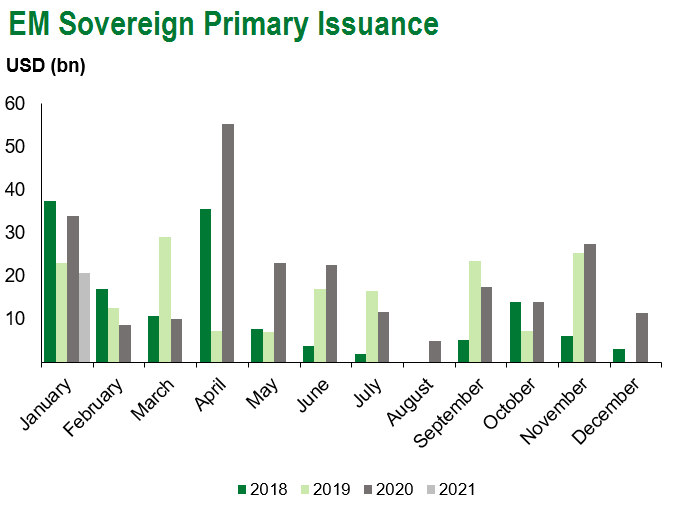
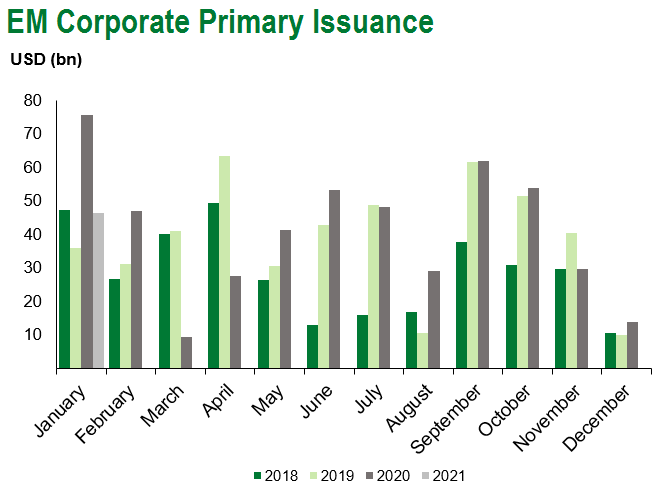
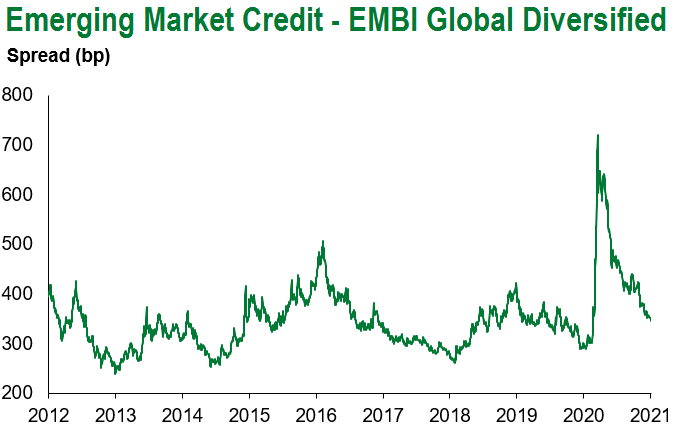
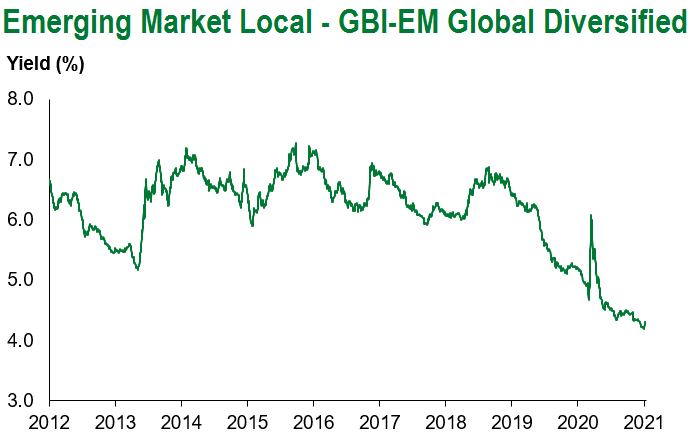
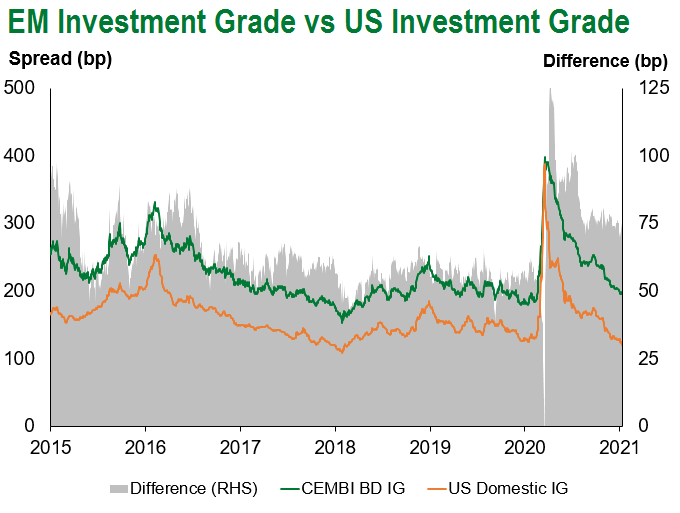
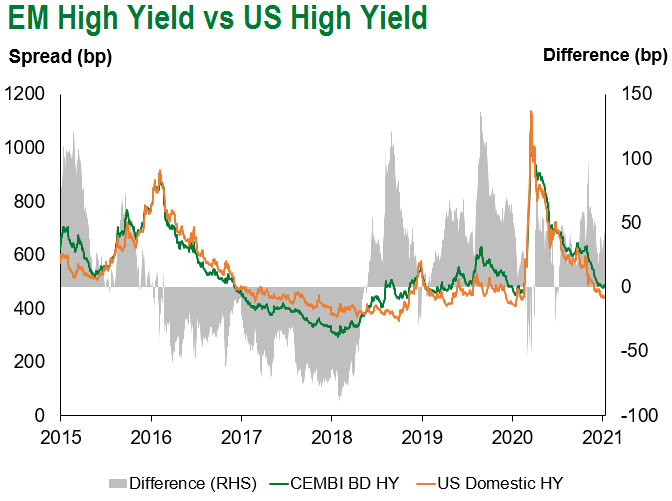
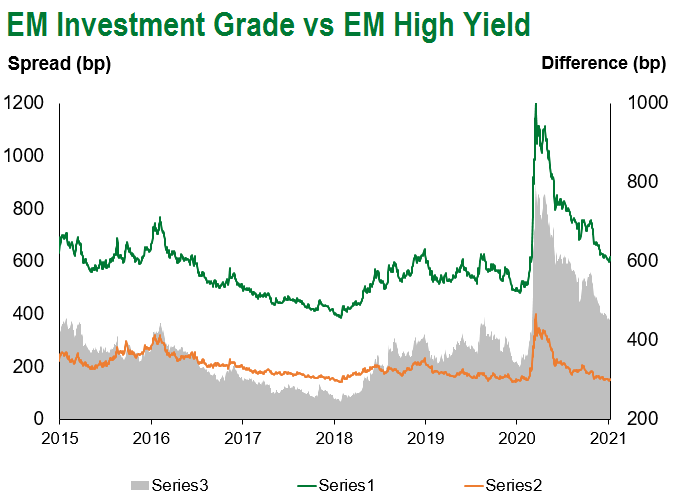
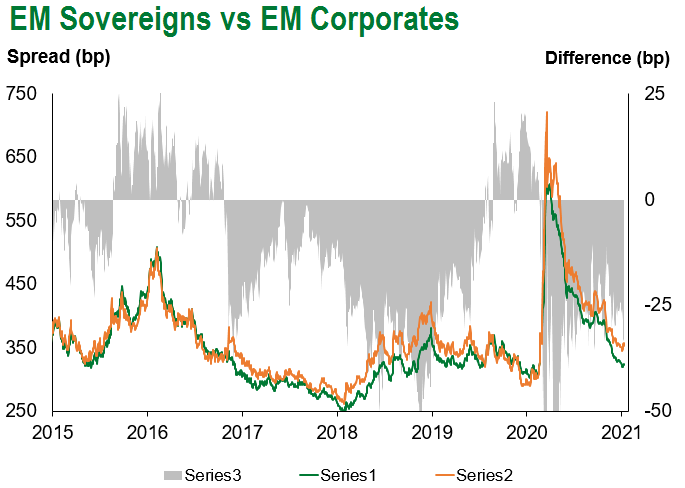
Emerging Markets Flows
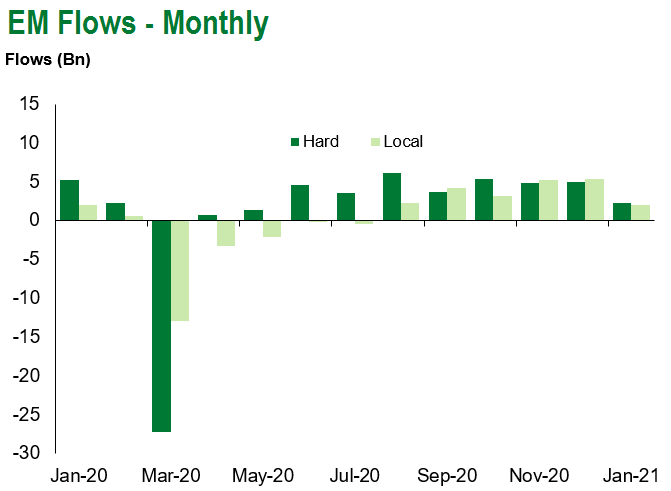
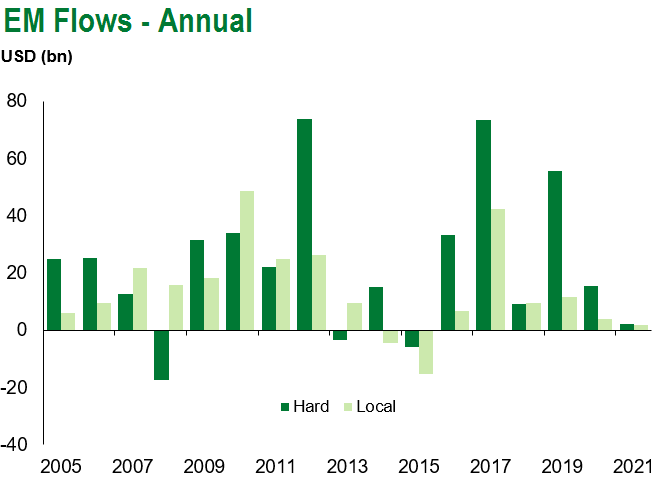
Source for graphs: Bloomberg, JPMorgan, Gramercy. As of January 15, 2021.
COVID Resources
Emerging Markets COVID-19 Case Summary
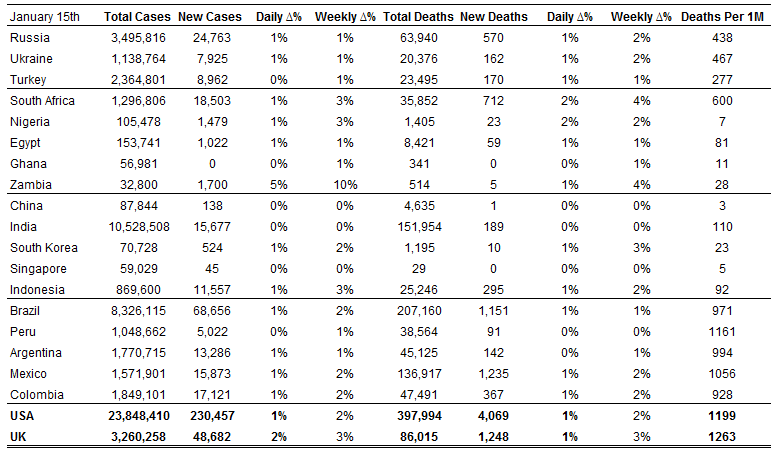
Source: Worldometer as of January 15, 2021.
Additional Crisis Resources:
Johns Hopkins COVID-19 Case Tracker
For questions, please contact:
Kathryn Exum, Senior Vice President, Sovereign Research Analyst, [email protected]
Petar Atanasov, Senior Vice President, Sovereign Research Analyst, [email protected]
Tolu Alamutu,CFA, Senior Vice President, Corporate Research Analyst, [email protected]
James Barry, Vice President, Corporate Research Analyst, [email protected]
This document is for informational purposes only. The information presented is not intended to be relied upon as a forecast, research or investment advice, and is not a recommendation, offer or solicitation to buy or sell any securities or to adopt any investment strategy. Gramercy may have current investment positions in the securities or sovereigns mentioned above. The information and opinions contained in this paper are as of the date of initial publication, derived from proprietary and nonproprietary sources deemed by Gramercy to be reliable, are not necessarily all-inclusive and are not guaranteed as to accuracy. This paper may contain “forward-looking” information that is not purely historical in nature. Such information may include, among other things, projections and forecasts. There is no guarantee that any forecasts made will come to pass. Reliance upon information in this paper is at the sole discretion of the reader. You should not rely on this presentation as the basis upon which to make an investment decision. Investment involves risk. There can be no assurance that investment objectives will be achieved. Investors must be prepared to bear the risk of a total loss of their investment. These risks are often heightened for investments in emerging/developing markets or smaller capital markets. International investing involves risks, including risks related to foreign currency, limited liquidity, less government regulation, and the possibility of substantial volatility due to adverse political, economic or other developments. The information provided herein is neither tax nor legal advice. Investors should speak to their tax professional for specific information regarding their tax situation.